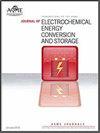Comparison-Transfer Learning Based State-of-Health Estimation for Lithium-ion Battery
IF 2.7
4区 工程技术
Q3 ELECTROCHEMISTRY
Journal of Electrochemical Energy Conversion and Storage
Pub Date : 2024-02-05
DOI:10.1115/1.4064656
引用次数: 0
Abstract
Rapid and accurate estimation of the state of health of lithium-ion batteries is of great significance. This paper aims to address two issues faced when applying deep learning methods to estimate the health status of lithium-ion batteries: high data quality requirements and poor model generalizability. And this paper proposes a comparison-transfer learning approach with cyclic synchronization to estimate the state of health of lithium-ion batteries. Firstly, a cyclic synchronization method based on the Bezier curve fitting algorithm is introduced to synchronize the data obtained at different charge-discharge cycles of the lithium-ion battery, facilitating input to the model. Secondly, a comparison-transfer network using Pearson correlation coefficient is proposed to transfer knowledge from the source dataset to predict the target dataset under different environmental temperatures. By training a pre-trained model on the source dataset and utilizing the correlation coefficient to analyze the similarity between the source and target datasets, the accumulated knowledge in the source dataset can be effectively utilized to enhance prediction performance on the target dataset. In the experiments, the proposed method is validated using the lithium-ion battery aging public datasets. The experimental results demonstrate that the proposed approach achieves superior prediction performance in the case of small sample sizes, exhibiting higher accuracy and stability compared to traditional deep learning methods.基于比较-转移学习的锂离子电池健康状态估计
快速准确地估计锂离子电池的健康状况具有重要意义。本文旨在解决应用深度学习方法估计锂离子电池健康状况时面临的两个问题:数据质量要求高和模型泛化能力差。本文提出了一种循环同步的比较转移学习方法来估计锂离子电池的健康状态。首先,引入基于贝塞尔曲线拟合算法的循环同步方法,同步锂离子电池不同充放电周期获得的数据,方便模型的输入。其次,提出了利用皮尔逊相关系数的比较转移网络,将源数据集的知识转移到预测不同环境温度下的目标数据集。通过在源数据集上训练预先训练好的模型,并利用相关系数分析源数据集和目标数据集之间的相似性,可以有效利用源数据集中积累的知识来提高对目标数据集的预测性能。在实验中,使用锂离子电池老化公共数据集对所提出的方法进行了验证。实验结果表明,与传统的深度学习方法相比,所提出的方法在样本量较小的情况下实现了更优越的预测性能,表现出更高的准确性和稳定性。
本文章由计算机程序翻译,如有差异,请以英文原文为准。
求助全文
约1分钟内获得全文
求助全文
来源期刊

Journal of Electrochemical Energy Conversion and Storage
Engineering-Mechanics of Materials
CiteScore
4.90
自引率
4.00%
发文量
69
期刊介绍:
The Journal of Electrochemical Energy Conversion and Storage focuses on processes, components, devices and systems that store and convert electrical and chemical energy. This journal publishes peer-reviewed archival scholarly articles, research papers, technical briefs, review articles, perspective articles, and special volumes. Specific areas of interest include electrochemical engineering, electrocatalysis, novel materials, analysis and design of components, devices, and systems, balance of plant, novel numerical and analytical simulations, advanced materials characterization, innovative material synthesis and manufacturing methods, thermal management, reliability, durability, and damage tolerance.
 求助内容:
求助内容: 应助结果提醒方式:
应助结果提醒方式:


